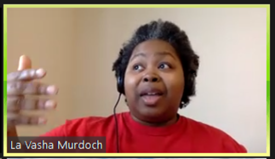Speaking Out for Educators’ Mental Health Needs
 As more and more of our students come to school with mental health challenges, more and more of us are feeling the impact of managing those challenges. Our students’ struggles can create mental health struggles for us and can lead to physical health problems as well. Now our state is stepping up to address the problem, and as part of the efforts formed a Secondary Trauma Leadership Team. La Vasha Murdoch, North Central WEA Council president, was appointed to this team and is lifting the voices and needs of educators in addressing secondary trauma.
As more and more of our students come to school with mental health challenges, more and more of us are feeling the impact of managing those challenges. Our students’ struggles can create mental health struggles for us and can lead to physical health problems as well. Now our state is stepping up to address the problem, and as part of the efforts formed a Secondary Trauma Leadership Team. La Vasha Murdoch, North Central WEA Council president, was appointed to this team and is lifting the voices and needs of educators in addressing secondary trauma.
“We focus on our kids’ mental health but not on the educators in the room as well,” La Vasha shared. “If we’re not ok, we can’t make sure our kids are ok.”
The Leadership Team was formed after educators, including bill sponsor and WEA member Rep. Lillian Ortiz-Self, advocated for the state to address growing secondary traumatic stress. Last year, WEA members helped pass a bill, SBH 1363: Addressing Workforce Secondary Traumatic Stress in the K-12 Workforce. La Vasha’s voice on the Leadership Team implementing the legislation brings to the table front-line educator experience and expertise.
“We need to be looking at the secondary trauma for not only the teachers, but the bus drivers, the paras, the kitchen staff, the counselors,” noted La Vasha. “Mental health needs to encompass all of us because we are all in this thing.”
While the Leadership Team has focused on the resource gathering required by the legislation, La Vasha sees the greater need for tangible, on-the-ground support. She has stressed how educators need the same sort of supports we need for our students.
“I hope that there will be defined resources for mental health for educators – money set aside for counseling and extra paid days that are not for structured PD but for SEL. Unstructured time to connect with one another so that we are not alone,” La Vasha remarked. “One good start would be paying for counseling for educators.”
She also brings an important equity lens to this work, recognizing that communities of color often face additional barriers to getting mental health supports, from cultural stigmas to fewer mental health resources in the community. “We know covid has impacted our communities of color harder than some others. If I count extended family, we lost 8 to covid in the last three years. I lost one colleague that I knew personally,” La Vasha shared.
“Members are telling me about panic attacks and ending up in the hospital because of the stress that they are under and trying to carry it alone. That's a lot of trauma to try to handle on our own. I know that I can't do it, so I reach out. I reach out to my family, to my union family, to my work family. Serving on this task force allows me to elevate their voices and hopefully with their stories get them what they need. Tangible things that can be put into place soon. They need it. They deserve it.”
“Educators being in the room when policies are being made about secondary trauma and destigmatizing talking about mental health, having community and knowing we’re not alone,” La Vasha emphasized. “We have to be pushing for the resources we need for educators also.”


